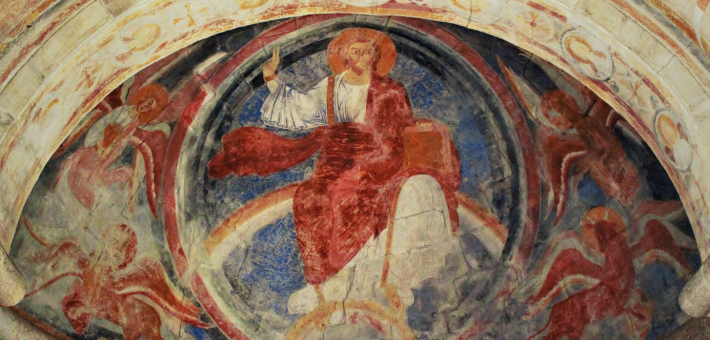Commentary on Ephesians 1:15-23
Like Alice through the looking glass, the perspective of the letters of Paul zooms in and out. Many of the issues dealt with in the letters concern small and local matters. For example, Paul and Sosthenes chide the members of the church at Corinth because they do a poor job sharing food (1 Corinthians 11:34). On a more positive note, Paul and Timothy thank the Philippians for their generosity in supporting their missionary journey (Philippians 4:15-16). In both cases, the writers of the letters address people by name and concern themselves with the everyday lives of the recipients.
The pericope for this week from the letter to the Ephesians starts on that same familiar level. Paul gives thanks for the Ephesians, not in general, but because he has heard particular things about them (1:15). He makes the point that the Ephesians fill his prayers with thanksgiving because of what they have done (“for this reason” 1:15). In many of the churches that I have attended, the prayers that the pastor and the congregation offer are primarily made up of concerns: prayers for healing, safety, comfort, changes in the world, et cetera. There is, of course, nothing wrong with this, but perhaps by making this point, Paul seeks to remind followers of Jesus that they also have an obligation to give thanks for the faith and love that their fellow Christians show.
The letter to the Ephesians does not dwell on the local for long though. Like Alice eating cake and then growing enormous, Paul’s rejoicing leads his letter out of the local and into the cosmic. This bouncing between the local and the cosmic occurs in many of Paul’s letters and leads to some of the more well-loved passages in the epistles. It occurs in Philippians 2, where Paul goes from instructing the Philippians to praising Christ’s humility and exaltation (Philippians 2:1-11). Likewise, in Romans 8, reflection on the hardship faced by the community in Rome lead to the assertion that nothing in the cosmos can separate Jesus Christ from his beloved people (Romans 8:31-39).
In this pericope, Paul repeats this pattern, beginning with Christ’s death and then moving on to his exaltation. In describing Jesus’ exaltation, Paul touches upon one of the themes that his modern interpreters often underemphasize, namely Jesus’ conflict with demonic powers. The underemphasis is in some ways a result of a problem in translation. The letters of Paul consistently refer to the demonic powers with abstract terminology. Here in Ephesians, the list is “rule and authority and power and dominion” (1:21). In Romans, Paul lists “angels, rulers, things present, things to come, [and] powers” (8:38-39). In Philippians, it is “every knee … in heaven and on earth and under the earth (Philippians 2:10).
In the modern world, each of these terms slips into the mundane world. To many hearers’ ears, they refer to governments and other ways that humans exercise power. That the letters of Paul have something different in mind can be seen most clearly in the letter to the Colossians. Colossians describes the work of Jesus on the cross as “disarming the powers and the authorities, making a public disgrace of them, triumphing over them in it [the cross]” (Colossians 2:15, my translation). This must refer to something beyond government on earth, because at the earthly level, the opposite happened. Pontius Pilate and the chief priests made a public disgrace of Jesus by crucifying him. Paul maintains over and over, however, that the apparent defeat of Jesus on earth is in fact his triumph over the demonic powers that hold humanity in slavery.
It is easy to understand why modern people have a hard time getting themselves in the same mindset as the letters of Paul. For one, as already noted, Paul’s world zooms in and out, from the local to the cosmic, sometimes without warning. More importantly, this worldview is often at odds with the idea that people are free actors and that the world can be explained. The world that Paul describes when he talks about “powers and authorities” is a world in which forces beyond the control of humans wreak havoc in their lives.
Perhaps, however, in 2023, Paul’s worldview has lost its foreign character. The list of things that plague the modern world sounds suspiciously beyond the control of most people: pandemic, climate change, racism, even inflation. These powers and authorities wreak havoc in people’s lives and even the best intentions of governments have failed to eradicate them. Even more depressing is the fact that some governments seem complicit with these powers, profiting from them even.
In this kind of world, the cosmic triumph of Christ begins to preach again. If Jesus Christ has triumphed over all of these authorities and dominions, their rule must be temporary. If Jesus Christ stands above every name that can be named, nothing new can threaten the fate of his followers. Christ the King Sunday continues to have relevance because rulers and authorities of all kinds continue to try and assert their will over the beloved of Jesus.
Christ the King Sunday is not an assertion of how Jesus Christ stands above the cosmos, as though Jesus were just another earthly ruler, content on selfish gain. Christ the King Sunday is a negation of all earthly rulers. It is the assertion that faith in Jesus and love toward all the saints triumphs over the naked power of government and the cruel mathematics of pandemics. Christ the King Sunday is the proclamation that local acts of faith and love are rooted in cosmic certainty.
It takes a spirit of wisdom and revelation to know this reality (1:17). It takes unceasing prayer and thanksgiving to understand the difference between the kingdom of Jesus and the kingdoms of this world. But the prayers of Christ’s church will continue to be that “with our eyes enlightened, we may know the hope to which he has called us, the riches of his glorious inheritance among the saints” (1:18).



November 26, 2023